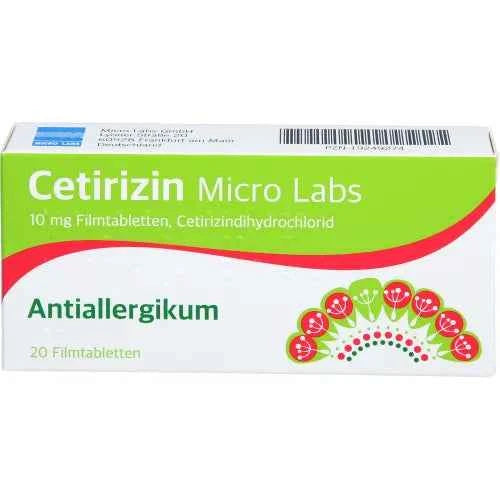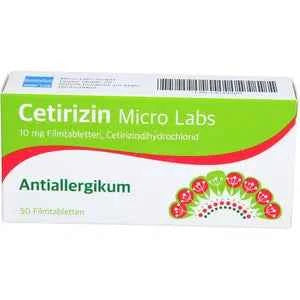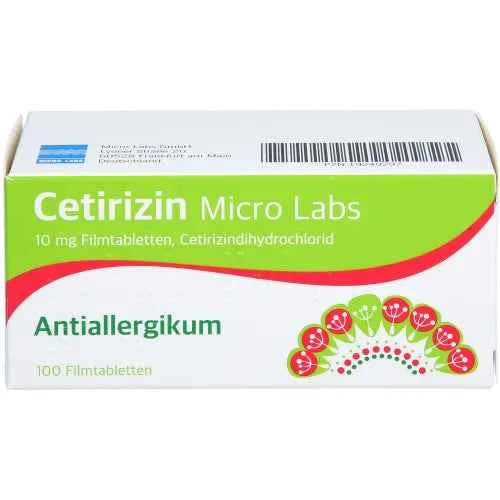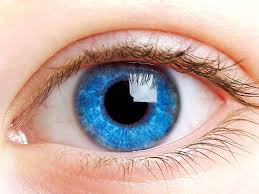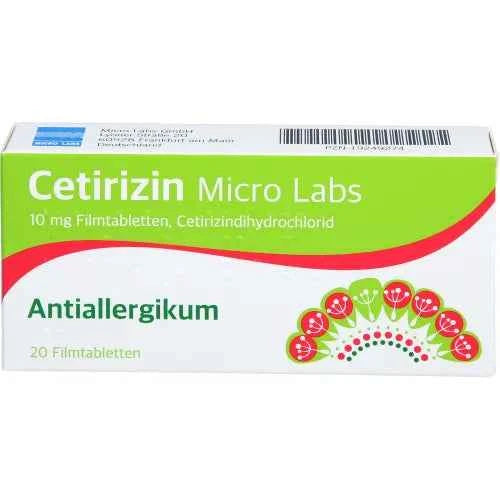1
/
of
1
Micro Labs GmbH
Micro Labs® Cetirizine 10 mg film-coated tablets
Micro Labs® Cetirizine 10 mg film-coated tablets
Regular price
£32.96 GBP
Regular price
£40.00 GBP
Sale price
£32.96 GBP
Unit price
/
per
Taxes included.
Couldn't load pickup availability
Micro Labs® Cetirizine 10 mg film-coated tablets
Antiallergic for the relief of symptoms of allergic rhinitis and urticaria
Active ingredients
- 10 mg cetirizine dihydrochloride
Excipients
- Magnesium stearate
- Hypromellose
- Corn starch, pregelatinized
- cornstarch
- 65 mg lactose monohydrate
- Macrogol 6000
- Titanium dioxide
- talc
- Cetirizine dihydrochloride is the active ingredient of the medicine.
- The preparation is an antiallergic.
-
In adults and children aged 6 years and over, the medicine is indicated for:
- Relief of nasal and eye symptoms in seasonal and perennial allergic rhinitis.
- Relief from hives (urticaria).
-
The medicine must not be taken
- if you are allergic to cetirizine, any of the other ingredients of this medicine, hydroxyzine or other piperazine derivatives (closely related active ingredients of other medicines)
- if you have severe kidney disease and require dialysis.
- Always take this medicine exactly as directed or as your doctor or pharmacist has told you. Ask your doctor or pharmacist if you are not sure.
-
Use in adults and adolescents over 12 years
- The recommended dose is: 10 mg once daily as 1 tablet
-
Use in children between 6 and 12 years
- The recommended dose is: 5 mg twice daily as half a tablet twice daily
-
Use in patients with kidney failure
- Patients with moderate renal impairment are recommended to take 5 mg once daily.
- If you suffer from severe kidney disease, please talk to your doctor or pharmacist, who can adjust your dose accordingly.
- If your child has severe kidney disease, please talk to your doctor or pharmacist, who can adjust the dose according to the child's needs.
-
Duration of intake
- The duration of use depends on the type, duration, and progression of your symptoms. Please consult your doctor or pharmacist for advice.
- If you feel that the effect of the medicine is too weak or too strong, please consult your doctor.
-
If you have taken more than you should
- If you think you have overdosed, please inform your doctor. Your doctor will then decide what action, if any, should be taken.
- Following an overdose, the side effects described below may occur with increased intensity. Adverse effects such as confusion, diarrhea, dizziness, fatigue, headache, malaise (general feeling unwell), dilated pupils, itching, restlessness, sedation, somnolence (drowsiness), drowsiness, rapid heartbeat, tremors, and urinary retention (inability to completely empty the bladder) have been reported.
-
If you forget to take it
- Do not take a double dose if you have forgotten to take the previous dose.
-
If you stop taking
- If you stop taking it, pruritus (intense itching) and/or urticaria (hives) may rarely recur.
- If you have any further questions on the use of this medicine, ask your doctor or pharmacist.
- Like all medicines, this medicine can cause side effects, although not everybody gets them.
-
The following side effects occur rarely or very rarely. If you experience these side effects, you must stop taking the medicine immediately and contact your doctor:
- Allergic reactions, including severe allergic reactions and angioedema (serious allergic reaction causing swelling of the face and throat).
- These reactions may occur shortly after you first take the medicine or later.
-
Common (may affect up to 1 in 10 people)
- Somnolence (drowsiness)
- Dizziness, headache
- Pharyngitis (sore throat), rhinitis (runny, blocked nose) (in children)
- Diarrhea, nausea, dry mouth
- fatigue
-
Uncommon (may affect up to 1 in 100 people)
- excitation
- Paresthesia (abnormal sensations on the skin)
- abdominal pain
- Pruritus (itching), rash
- Asthenia (extreme fatigue), malaise (general malaise)
-
Rare (may affect up to 1 in 1,000 people)
- Allergic reactions, some of them severe (very rare)
- Depression, hallucination, aggression, confusion, insomnia
- Convulsions (seizures)
- Tachycardia (too fast heartbeat)
- abnormal liver function
- Urticaria (itchy rash)
- Edema (swelling)
- Weight gain
-
Very rare (may affect up to 1 in 10,000 people)
- Thrombocytopenia (low number of platelets)
- Tics (recurring, nervous muscle twitches and vocalizations)
- Syncope (loss of consciousness), dyskinesia (involuntary movements), dystonia (abnormal, persistent, involuntary muscle tension), tremor (shaking), dysgeusia (altered sense of taste)
- Blurred vision, accommodation disorders (impaired ability of the eye to adjust to near/far vision), oculogyric crisis (uncontrollable circular movement of the eyes)
- Angioedema (serious allergic reaction causing swelling of the face or throat), fixed drug rash (drug allergy)
- Abnormal urination (bedwetting, pain and/or difficulty urinating)
-
Not known (frequency cannot be estimated from the available data):
- Increased appetite
- Suicidal ideation (recurring thoughts of suicide or preoccupation with suicide), nightmares
- Amnesia (memory loss), memory disorders
- Vertigo (spinning sensation)
- Urinary retention (inability to completely empty the bladder)
- Pruritus (intense itching) and/or urticaria (hives) when stopping treatment
- Arthralgia (joint pain), myalgia (muscle pain)
- Acute generalized pustular exanthema (rash with blisters containing pus)
- Hepatitis (inflammation of the liver)
- If you experience any side effects, contact your doctor or pharmacist. This includes any possible side effects not listed.
Share
